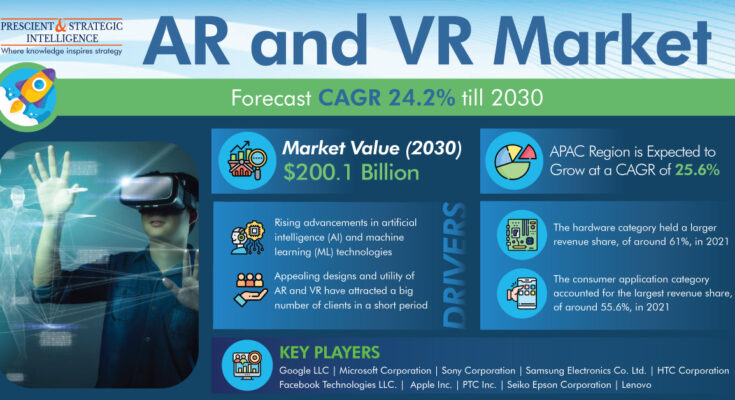As per a report by P&S Intelligence, AR and VR market was sized $28.5 billion in 2021, and it will reach $200.1 billion by 2030, growing at rate of 24.2% by the end of this decade.
The growth of this industry has a lot to do with the increasing acceptance of these technologies in the entertainment, education, gaming, tourism, retail, and healthcare industry.
AR technology had a higher share in the past. The surging emphasis of companies on the development of innovative methods for capitalizing on the potential of AR technology and offering an engaging and unique experience to end users will fuel the need of this technology in the years to come.
Moreover, the growing use of smart glasses, smartphones and the successive increase in the usage of mobile AR technologies for delivering an immersive experience, will drive the industry in the future.
The hardware category had a larger share of revenue in the past, of about 61%, because of a considerable dip cost of hardware components, easy availability, and their immense popularity in the gaming sector.
Moreover, it will produce a higher revenue also in the near future. This will have a lot to do with the increasing requirement for quality entertainment content and the focus of companies on the improvement their display features and providing tailored items to the companies.
Consumer application had the largest share of revenue in the past of approximately 55.6%, and it will dominate the AR and VR market in the years to come as well. This is chiefly because of the increasing awareness of these cutting-edge technologies and the growing demand for more immersive and interactive games.
Moreover, the increasing usable income has worked wonders in improving the sales of gaming systems, which would boost the growth of the industry in the near future as well.
The use of smartphones and advancements in technology have let people of viewing virtual graphics embedded in real-life surroundings. Also, users might connect with objects and pictures for engaging with them by just making use of a camera on their smartphones.
Furthermore, AR and VR technologies have become major smartphone components, and the requirement for these technologies is powered by the increasing requirement for such devices. Furthermore, smartphone manufacturers are working to produce the next gen computing devices, which will open up new avenues for the growth of the industry.
North America had the largest revenue share of 35%. The U.S. and Canada governments are making heavy investments in the deployment of these technologies for healthcare, aerospace & defense, and education, for training purposes, which will boost the demand in the region.
While, APAC had about 25%, share, and it will grow the fastest in the coming years. The main reason for this is the increasing investments in the defense and commercial sectors, development in the automotive and healthcare industries, and fast industrialization in China, India, Japan, and South Korea.
With increasing advancements in ML and AI, the demand for AR and VR technologies is on the rise.




